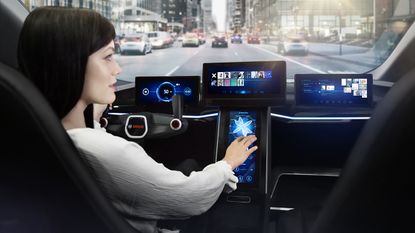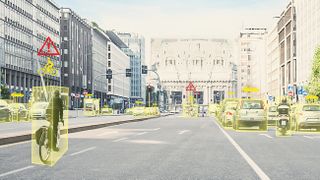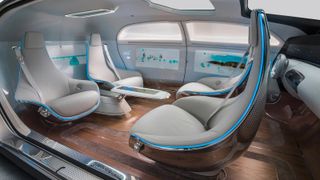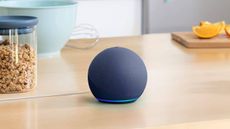

If car manufacturers can be believed, we could be cruising around in autonomous cars as early as 2020, and advances in artificial intelligence (AI) will be the driving force behind the rapid advances.
The biggest challenge self-driving cars will have to overcome is the fact that no two driving situations will ever be the same, and the vehicle will need to react to unique traffic, pedestrians, and road conditions instantly.
- The future of cars: zero emissions, zero stress, zero accidents
- How AI will revolutionise the videos and photos you create
That’s where artificial intelligent comes in. There’s no way engineers will be able to write instructions for every scenario — vehicle manufacturers will need to use big data and machine learning to make the vehicle act like a human driver.
This may sound like a simple task, but it requires an immense amount of processing power and extremely advanced sensors.
It’s not just car companies, like Volkswagen, Mercedes and BMW that are investing millions into research of this technology; it’s also tech giants such as Google, Uber, Tesla and Qualcomm. Even Bosch is at it.
So, how will autonomous cars actually work?
Cars will be kitted out with an array of sensors which gives the vehicle a 360-degree view of its environment. The types of sensor used will depend on the manufacturer, but most will use a combination of lidar, radar, laser, and video cameras.
Sign up to the T3 newsletter for smarter living straight to your inbox
Get all the latest news, reviews, deals and buying guides on gorgeous tech, home and active products from the T3 experts
These will give the car a 360-degree view of the world, with advanced AI in place to interpret the data from these sensors, keeping the vehicle on the road and reacting to scenarios as they happen.
But how will AI have an impact on your life? We’re glad you asked…

You'll get to your destination more quickly
Everyone wants to shorten their car journeys, and AI will be a key player in making that a reality.
We’re already starting to see the beginnings of this, but with further advances in technology, you can expect it to be even more effective and accurate.
Take Google Maps, for example. Google currently learns your commute, and will suggest the quickest route every morning to avoid traffic.
It can also dynamically re-direct you if there’s been an accident on your usual route.
To ensure you get to work on time, you can even ask Google Home how long your commute is going to take, and what time you should leave.
Combined, these systems help you shorten your journey as much as possible, letting you leave later in the mornings, and avoid sitting in traffic.
In the future, when we start to get vehicle-to-vehicle and vehicle-to-infrastructure communication, these predictions will become even more accurate, with servers being able to re-direct cars to avoid traffic jams at known pinch points.
Traffic jams will be a thing of the past.
Jaguar Land Rover is currently testing these sorts of systems in and around Coventry. The hope is that, ultimately, the technology will reduce phantom traffic jams, increase road capacity (as you'd be able to fit more cars in a smaller space), and reduce accidents.
Of course, this only makes sense if it works with every car on the road, not just those made by Jaguar Land Rover. So JLR is working with a consortium to ensure a standard communication protocol is adopted by the whole industry.

Traveling by car will become safer
As well as making your journeys faster, AI will also make your journeys safer. We’ll start to see this with so-called “Guardian Angel” technology.
This is an evolution of the safety systems we currently have in vehicles. Rather than being fully autonomous, a guardian angel system would assist the driver, augmenting human driving.
For example, the car would automatically steer away from a collision the driver didn’t see, apply the brakes to avoid a collision, or stop a driver from hitting something in their blind spot.
We’ve seen these sorts of systems in the BMW 5 Series and Audi A8.
Of course, the ultimate goal with fully autonomous cars is to eliminate accidents altogether, but an important ethical question has arisen during the development of AI driving system — if an accident is unavoidable, who does the car choose to harm?
For example, does the vehicle maintain its course and kill a group of school children, or divert its course and hit an elderly couple?
Work on developing machine morality is already underway, with Massachusetts Institute of Technology (MIT) using crowdsourced, human perspective to inform these decisions.
You can head over to The Moral Machine to add your perspective to the scenarios.

You'll arrive at your destination relaxed
Making journeys smoother and safer is naturally going to lead us onto making journeys more relaxing. The recent semi-autonomous systems, such as adaptive cruise control and lane keep assist, already make long journeys and traffic jams less stressful.
In 2025, when you hop into a fully autonomous vehicle with no steering wheel, and you watch BBC Breakfast during your commute, while the car automatically navigates the fastest route, avoiding all traffic, it’s going to make journeys completely stress-free.
This will be combined with more advanced infotainment systems, which can learn your behaviour (automatically switching to Radio 2 in the morning, but Radio 4 in the afternoon, for example), and feature improved speech recognition, so the interior of the car is more like a serene spa than a button-filled machine.
Yep, we can’t wait.

As the Style and Travel Editor at T3, Spencer covers everything from clothes to cars and watches to hotels. Everything that's cool, stylish, and interesting, basically. He's been a part of T3 for over seven years, and in that time covered every industry event known to man, from CES and MWC to the Geneva Motorshow and Baselworld. When he's driving up and down the country in search of the greatest driving roads, he can be found messing around on an electric scooter, playing with luxury watches, or testing the latest fragrances.
-
 Lenovo's new PC gaming handheld is a big (or little) surprise
Lenovo's new PC gaming handheld is a big (or little) surpriseThe Legion Go S makes things more truly handheld
By Max Freeman-Mills Published
-
 I tested Lenovo's new rollable laptop and was shocked – it's like nothing else
I tested Lenovo's new rollable laptop and was shocked – it's like nothing elseThe Lenovo ThinkBook Plus Gen 6 rollable transforms from 14-inch to 16.7-inch at the touch of a button – and it's amazing
By Mike Lowe Published
-
 Future Samsung phone update could be an AI-powered window to the outside world
Future Samsung phone update could be an AI-powered window to the outside worldA recently unveiled patent could spell a big change to your wallpaper
By Sam Cross Published
-
 Google's "Willow" quantum chip won't just change future computers, it could change the world
Google's "Willow" quantum chip won't just change future computers, it could change the worldWillow smashes benchmarks at a level hard to comprehend
By Chris Hall Published
-
 Productivity 101: how to maximize your life with an AI PC
Productivity 101: how to maximize your life with an AI PCRobert Hallock, VP and general Manager, client AI and technical marketing at Intel explains the advantages of AI computing
By T3.com Published
-
 Your Chromebook is getting a major AI upgrade for free
Your Chromebook is getting a major AI upgrade for freeNew features are coming soon to Chromebook and Chromebook Plus
By Rik Henderson Published
-
 HP unveils first device with built-in AI assistant, the OmniBook X
HP unveils first device with built-in AI assistant, the OmniBook XWith an increased reliance on AI and remote working conditions, the OmniBook X features a variety of enhanced tools that will significantly optimise its user experience
By T3.com Published
-
 The best AI feature I've seen this week didn't come from Apple Intelligence
The best AI feature I've seen this week didn't come from Apple IntelligenceThis could be a game changer in the fight against AI bad actors
By Sam Cross Published
-
 Amazon's paid Alexa service is finally nearing launch
Amazon's paid Alexa service is finally nearing launchAlexa's getting some premium smarts
By Max Freeman-Mills Published
-
 Meta Quest looks set to get AI before the Apple Vision Pro
Meta Quest looks set to get AI before the Apple Vision ProNew features are reportedly coming soon
By Max Freeman-Mills Published